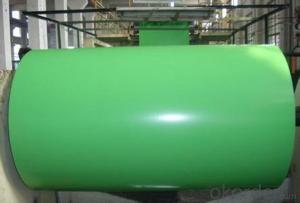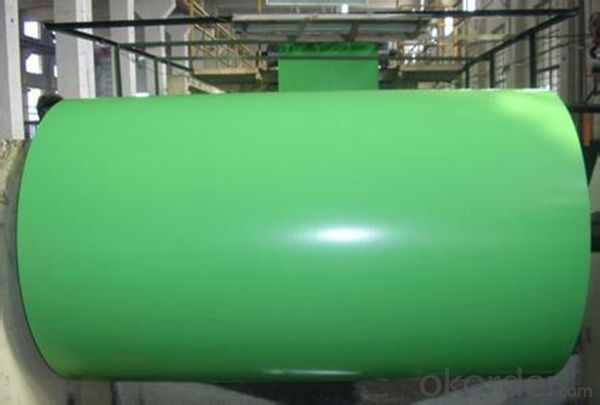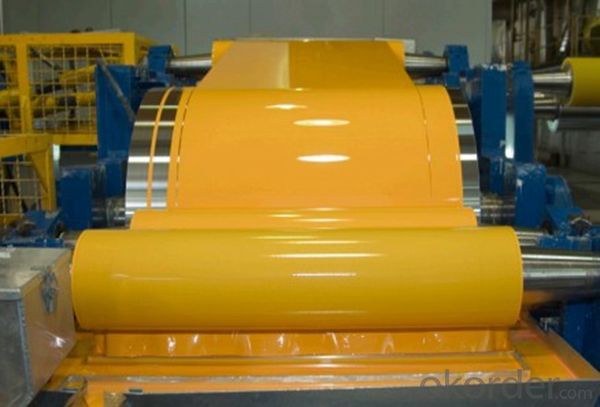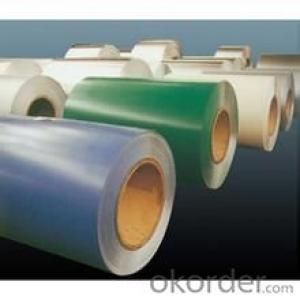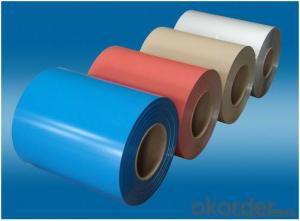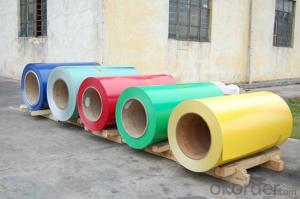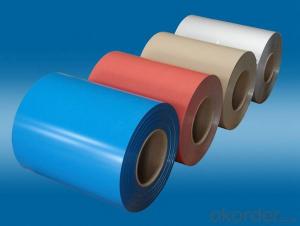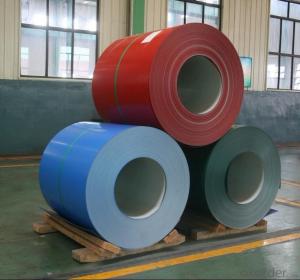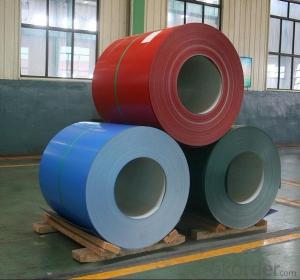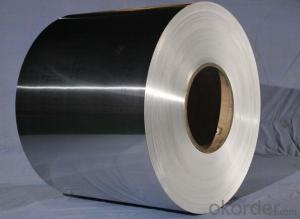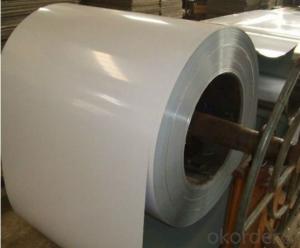Painted Aluminum Coil for Curtain Wall Decoration
- Loading Port:
- Shanghai
- Payment Terms:
- TT OR LC
- Min Order Qty:
- 5 m.t.
- Supply Capability:
- 100000 m.t./month
OKorder Service Pledge
OKorder Financial Service
You Might Also Like
Specification
1. Specification of Color Coated Aluminium Coil for Curtain Wall Decoration
Name | 3003 Aluminum Coil |
Brand | CNBM |
Alloy | 1100H-18, 3003-H24,3003-H26,3005-H26,8011,3004,3105,5005,etc. |
Thickness | 0.1~1.5mm |
Width | <2000mm< span=""> |
MOQ | 1 MT |
Coating finish | Brushed, drawing, embossed, printing |
Color | As to code RAL |
Surface | Embossed,Mill Finish,Coated,Brushed |
Gloss | 10-90%(EN ISO-2813:1994) |
Total coating thick | PVDF27 ~35micron |
Polyester18~27micron(EN ISO-2360:1995) | |
Coating hardness | 2H |
Adhesion | 5B (EN ISO-2409:1994) |
Impact resistance | No cracking and peeling (A.S.T.M D2794-1993) |
Flexibility (T-bend) | 0T- 2T |
MEK resistance | 100 |
Certification | ISO9001:2000, CE, SGS |
Coil's standard diameter | 1100mm |
Inner Diameter | 405mm/505mm |
Coil's standard weight | 1MT - 2MT |
2. Application of Color Coated Aluminium Coil for Curtain Wall Decoration
(1).Interior: wall cladding, ceilings, bathrooms, kitchens and balconies, shutters, doors...
(2).Exterior: wall cladding, facades, roofing, canopies, tunnels,column covers , renovations...
(3).Advertisement: display platforms, signboards, fascia, shop fronts...
3. Feature of Color Coated Aluminium Coil for Curtain Wall Decoration
*Such coil is specially designed to replace aluminum ingot, due to the high export tax of aluminum ingot, the coil has better price than ingot.
*This type of coil can fit customer's remelting furnace just like ingot, no need to make any change to the production line that was previously used for ingot. The standard coil size and weight is very suitable for the feed gate of furnace.
*This type of coil causes less material wastage than ingot when remelted.
*Our coil is made directly from ore, no need to go though the ingot making process, quality is much better than other suppliers who use ingot scrap to make coil.
Be free from Oil Stain, Dent, Inclusion, Scratches, Stain, Oxide Dicoloration, Breaks, Corrosion, Roll Marks, Dirt Streaks and other defect which will interfere with use
4. Certificate:
SGS and ROHS(if client request, paid by client), MTC(plant provided), Certificate of Origin(FORM A, FORM E, CO), Bureau Veritas and SGS (if client request, paid by client), CIQS certificate
5. Image of Color Coated Aluminium Coil for Curtain Wall Decoration
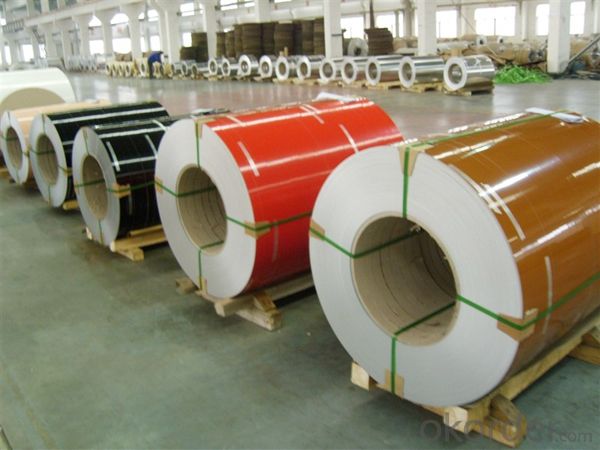
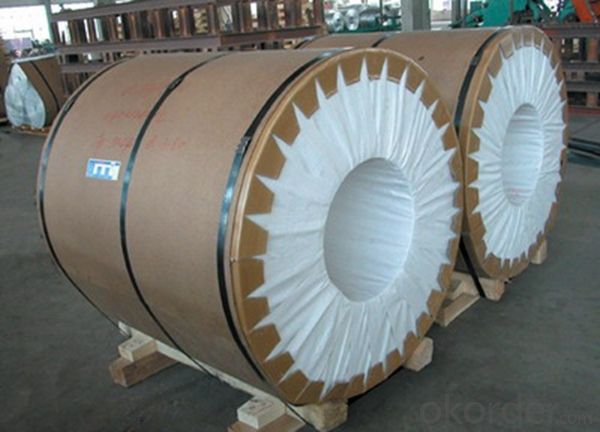
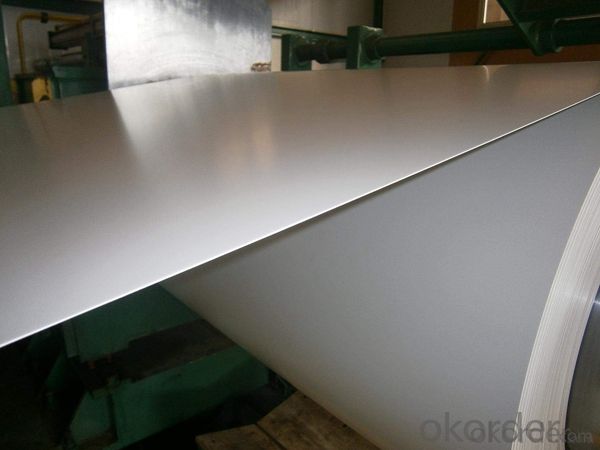
6. Package and shipping of Color Coated Aluminium Coil for Curtain Wall Decoration
eye to wall
eye to the wall
with wood pallet (wooded case also available)
7. FAQ
1) What is the delivery time?
Dpends on actual order, around 20 to 35 days
2)What is the QC system:
We have QC staff of 20 persons and advanced equipment, each production is with MTC traced from Aluminum ingot lot.
3) What market do you mainly sell to?
Australia, America, Asia, Middle East, Western Europe, Africa etc
- Q: I'm wondering if there is a resin/molding material that can withstand the heat of melted aluminum for casting parts. I know that sand casting is the 'norm' but is there anything else? I'd rather not have to pack sand every time I want to cast a part.Thanks!
- One common mold material for metal casting is plaster mixed with silica sand to give it more strength. It needs to be completely (like heated) dry before you use it, but it is actually more work than sand casting but it gives a better finish. There are some rubber materials which can withstand the heat of casting pewter, but the melting point of pewter is so much lower than aluminum that I am sure those won't work for aluminum. I think you are pretty much stuck with sand for the easiest method.
- Q: How much will be burned out if the soaked and oxidized 5182 aluminum coil is melt down and reprocessed?
- Burn out rate is generally between 1% -2.5%, but that varies among plants as their actual situations are different.
- Q: Is it possible to create a mobile phone stand or holder using aluminum coils?
- <p>Yes, you can use aluminum coils to make a mobile phone stand or holder. Aluminum is lightweight, durable, and easy to shape, making it a suitable material for such DIY projects. You can bend the aluminum coil into the desired shape to support your phone, either horizontally or vertically. Ensure the coil's diameter is appropriate to hold your phone securely without causing any damage. Remember to smooth any rough edges to prevent scratches on your phone.</p>
- Q: Are aluminum coils suitable for electrical conductors?
- Aluminum coils, indeed, prove to be suitable for electrical conductors. Due to its remarkable electrical conductivity, aluminum has become a widely utilized material in the electrical industry. It possesses approximately 61% conductivity in comparison to copper, the utmost commonly employed metal for electrical conductors. Lightweight, cost-effective, and possessing good thermal conductivity, aluminum coils have become a favored selection for a range of electrical applications. Nonetheless, it is noteworthy that aluminum has a lower tensile strength than copper, thus potentially demanding a larger cross-sectional area to attain an equivalent level of current carrying capacity. Furthermore, to prevent oxidation and guarantee efficient electrical conductivity in aluminum coils, it is imperative to employ proper insulation and connectors.
- Q: Can aluminum coils be used for automotive body panels?
- Yes, aluminum coils can be used for automotive body panels. In fact, aluminum is a popular choice for car manufacturers due to its lightweight and corrosion-resistant properties, leading to improved fuel efficiency and longevity of the vehicle.
- Q: Why does the coated aluminum coil have thickness requirement for membrane?
- The purpose of coating is to protect the surface of aluminum coil and make it more aesthetic. The thickness of membrane is closely related to the keep years of products made by aluminum coil.
- Q: Can aluminum coils be used for HVAC ducting?
- Yes, aluminum coils can be used for HVAC ducting. Aluminum is a popular choice for ducting due to its lightweight nature, corrosion resistance, and ability to efficiently transfer heat. It is commonly used in both residential and commercial HVAC systems.
- Q: What are the weight and thickness options for aluminum coils?
- The weight and thickness of aluminum coils can differ based on specific requirements and applications. There is a wide range of weight and thickness options available for aluminum coils to meet the needs of different industries. In terms of weight, aluminum coils are offered in various choices including light gauge, standard gauge, and heavy gauge. Light gauge aluminum coils generally have a thickness ranging from 0.006 to 0.025 inches and are commonly utilized in industries that require lightweight materials like packaging, electronics, and automotive components. Standard gauge aluminum coils are slightly thicker, ranging from 0.026 to 0.063 inches, and are often used in construction, roofing, and transportation applications. Heavy gauge aluminum coils are the thickest option, typically measuring 0.064 inches and above, and are frequently employed in heavy-duty applications such as aerospace, marine, and industrial equipment manufacturing. As for thickness, aluminum coils are available in various options as well. The thickness is usually measured in inches or millimeters, and the range can vary from as thin as 0.006 inches (0.15 mm) to as thick as 0.25 inches (6.35 mm) or even higher for specific applications. The suitable thickness of the aluminum coil depends on the intended use and the desired level of structural strength or flexibility required. It is important to note that these weight and thickness options may differ depending on the manufacturer and the specific aluminum alloy utilized. It is always advisable to consult with the manufacturer or supplier to determine the most appropriate weight and thickness options for your specific application.
- Q: What is the purpose of an aluminum coil and what are its applications?
- <p>An aluminum coil is a versatile material that serves various functions. It is used in numerous applications due to its lightweight, corrosion resistance, and high thermal and electrical conductivity. Common uses include manufacturing heat exchangers, transformers, and electrical wiring. Aluminum coils are also utilized in the construction of automotive parts, aerospace components, and in the packaging industry for cans and foils. Additionally, they are employed in the HVAC industry for air conditioning and heating systems, and in the production of various consumer goods.</p>
- Q: What is the role of aluminum coils in the construction of aircraft?
- The role of aluminum coils in the construction of aircraft is crucial and multifaceted. Aluminum is the preferred material for manufacturing aircraft due to its exceptional properties such as lightweight, durability, and corrosion resistance. Aluminum coils, specifically, are used extensively in various parts of an aircraft, including the fuselage, wings, and structural components. One of the primary functions of aluminum coils is to provide structural strength while maintaining a lightweight design. By using aluminum coils, aircraft manufacturers can reduce the overall weight of the aircraft, leading to improved fuel efficiency and increased payload capacity. This is especially important in aviation, where every ounce of weight reduction can have a significant impact on performance and operational costs. Additionally, aluminum coils play a crucial role in the aerodynamic design of an aircraft. These coils are used to shape the wings and other aerodynamic surfaces, allowing for better airflow and reduced drag. The flexibility of aluminum coils enables engineers to create complex, curved shapes that optimize the aircraft's aerodynamic performance, resulting in improved maneuverability and reduced fuel consumption. Another vital aspect of aluminum coils in aircraft construction is their corrosion resistance. Aluminum naturally forms a protective oxide layer when exposed to air, making it highly resistant to corrosion. This property is essential in ensuring the longevity and structural integrity of the aircraft, particularly when exposed to harsh environmental conditions, such as high-altitude or coastal regions. Furthermore, aluminum coils are used in the fabrication of heat exchangers, which are crucial components in the aircraft's cooling and ventilation systems. These coils efficiently transfer heat either to or from the air, depending on the system's requirements, allowing for effective temperature control within the aircraft's cabin and engine compartments. In conclusion, the role of aluminum coils in the construction of aircraft is indispensable. They provide structural strength, contribute to aerodynamic efficiency, offer corrosion resistance, and facilitate efficient heat exchange. The utilization of aluminum coils allows for the development of high-performance, reliable, and fuel-efficient aircraft essential for modern aviation.
Send your message to us
Painted Aluminum Coil for Curtain Wall Decoration
- Loading Port:
- Shanghai
- Payment Terms:
- TT OR LC
- Min Order Qty:
- 5 m.t.
- Supply Capability:
- 100000 m.t./month
OKorder Service Pledge
OKorder Financial Service
Similar products
Hot products
Hot Searches
Related keywords
